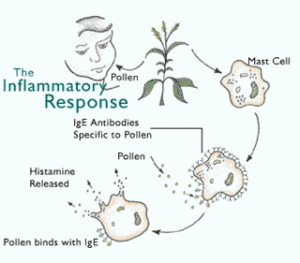Inflammation & Asthma
Inflammation is an essential part of the functioning of a normal lung. Tiny areas of inflammation occur thousands of times a day in order to combat the viruses, bacteria and pollutants to which we are exposed. These hostile factors when inhaled into your lungs stick to the surface of the airways. The body uses the inflammatory response of IgE to break down and remove them. Normally, none of this activity produces any obvious symptoms. However, asthmatics hyper-react to some factors, aggravating inflammation throughout the small and medium airways. It is thought that asthmatics, over-produce unique IgE antibodies in response to these factors.
You inhale something for the first time, say pollen for example. Your body’s immune system decides that the pollen is a danger to your safety and creates a specific IgE antibody to the pollen (now called an allergen). Each time you inhale the allergen the IgE antibody is made in huge numbers to defend the body from this perceived danger. As part of the defense process, inflammation occurs.
The IgE antibodies are attached to a part of the immune system called the mast cells. When these IgE antibodies attach onto an allergen, they trigger the mast cells to release a host of chemicals called inflammatory mediators.
The inflammatory mediators released by the mast cells include histamine and leukotrienes. These substances irritate the sensitive linings of your airways, just as continuously scratching an insect bite aggravates your skin. The release of histamine and leukotriene causes the spasming of smooth muscle and the airways to swell and produce increased amounts of mucus.

As a result, blood vessels near the allergen widen. This increases blood flow bringing as many white blood cells and inflammatory mediators to the area as possible. The walls of the blood vessels become leaky, allowing white blood cells and the inflammatory mediators to leave the blood and engulf the allergen. The inflammation caused by these chemicals keep restricting the airways, thus prolonging the asthma attack.
